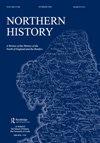“致不朽的记忆”:兰开斯特的克里米亚战争纪念碑,约1855 - 1862年
IF 0.2
3区 历史学
Q2 HISTORY
引用次数: 0
摘要
这篇文章探讨了兰开斯特克里米亚战争纪念碑在1860年11月被忽视的历史。它将纪念碑与该镇世纪中期历史的两个关键特征联系起来:保守党的家长作风和与当代“志愿者运动”有关的民众爱国主义的复兴。它还确立了该结构的更广泛意义,特别是在英国对待战争纪念的方式方面。特别是,它认为纪念碑的一个关键特征——它载有该镇19名普通军人的名字——使人们普遍接受的纪念这位“普通士兵”的兴趣首次在英国出现的年表变得复杂。从这个意义上说,兰开斯特的克里米亚战争纪念碑是维多利亚中后期的几座纪念碑之一,因为布尔战争发生在维多利亚后期,它预示着1918年后战争纪念的决定性质量,托马斯·拉奎尔称之为“死名主义”(即对死者的命名,无论阶级或地位如何)。因此,这座纪念碑表明了兰开斯特世纪中期的社会政治,它也对英国战争纪念历史的关键细节进行了有益的细微差别。本文章由计算机程序翻译,如有差异,请以英文原文为准。
‘TO IMPERISHABLE MEMORY’: LANCASTER’S CRIMEAN WAR MONUMENT, c.1855–1862
This article examines the previously neglected history of Lancaster's Crimean War monument, dedicated in November 1860. It connects the monument to two key features of the town's mid-century history: Tory paternalism and a resurgent popular patriotism linked to the contemporary 'Volunteer Movement’. It also establishes the broader significance of the structure, especially in terms of British approaches to war commemoration. In particular, it argues that a key feature of the monument—it carries the names of nineteen of the town's servicemen, all rank and file—complicates the generally accepted chronology of when interest in commemorating the 'common soldier' first emerged in Britain. In this sense, Lancaster's Crimean War monument is one of several mid- and late-Victorian monuments, as the Boer War took place in the later Victorian period, that anticipated the defining quality of war remembrance in the post-1918 period, what Thomas Laqueur has called 'necronominalism' (that is, the naming of the dead, regardless of class or status). The monument is thus indicative of Lancaster's mid-century social politics and it also nuances, usefully, key details regarding the history of British war commemoration.
求助全文
通过发布文献求助,成功后即可免费获取论文全文。
去求助
来源期刊

Northern History
Multiple-
CiteScore
0.20
自引率
33.30%
发文量
37
期刊介绍:
Northern History was the first regional historical journal. Produced since 1966 under the auspices of the School of History, University of Leeds, its purpose is to publish scholarly work on the history of the seven historic Northern counties of England: Cheshire, Cumberland, Durham, Lancashire, Northumberland, Westmorland and Yorkshire. Since it was launched it has always been a refereed journal, attracting articles on Northern subjects from historians in many parts of the world.
 求助内容:
求助内容: 应助结果提醒方式:
应助结果提醒方式:


